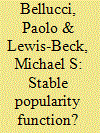|
|
|
Sort Order |
|
|
|
Items / Page
|
|
|
|
|
|
|
| Srl | Item |
| 1 |
ID:
102575


|
|
|
|
|
| Publication |
2011.
|
| Summary/Abstract |
Market economies inevitably generate social inequalities, of which the new democracies of Central and East European (CEE) societies have seen dramatic - though widely diverging - levels of growth. Do CEE citizens believe that inequality is excessive and, if so, why? And what is the connection between perceptions of social inequality and citizens' views of new markets and democracy? These questions are addressed using new data from mass surveys conducted in 2007 in 12 post-communist CEE states. Surprisingly weak links are found between social inequality perceptions and national-level measures of inequality as well economic, social and political conditions. Perceptions of social inequality are mainly driven by individual-level assessments of market and democratic performance, but not by market or democratic ideals.
|
|
|
|
|
|
|
|
|
|
|
|
|
|
|
|
| 2 |
ID:
102570


|
|
|
|
|
| Publication |
2011.
|
| Summary/Abstract |
The effect of globalisation on social spending is one of the most intensely studied issues in the political economy literature. Until recently, conventional wisdom held that globalisation leads governments to expand social spending to compensate workers for increasing risk exposure. The latest research shows, however, that globalisation has become strongly associated with spending cutbacks since the late 1980s. This article adds to this research by arguing that the negative impact of globalisation is conditioned on the capitalist system in different countries. In coordinated market economies (CMEs), employers are dependent on the willingness of the workforce to invest in specific skills and therefore become supportive of extensive social spending. Not so in liberal market economies (LMEs), where employers are much less dependent on social spending because the workforce in general invests less in specific skills. Employers in LMEs are therefore likely to use increasing globalisation as a means to push through retrenchment, whereas employers in CMEs are not. This argument is tested in a time-series cross-section regression analysis, which clearly supports it.
|
|
|
|
|
|
|
|
|
|
|
|
|
|
|
|
| 3 |
ID:
102576


|
|
|
|
|
| Publication |
2011.
|
| Summary/Abstract |
Scholars have repeatedly expressed concern about the consequences low levels of political trust might have for the stability of democratic political systems. Empirical support and the identification of causal mechanisms for this concern, however, are often lacking. In this article, the relation between political trust and law-abiding attitudes is investigated. It is expected that citizens with low levels of trust in the institutions of the political system will find it more acceptable to break the law. As a result, low levels of political trust might undermine the effectiveness and legitimacy of government action and its ability to implement legislation. Based on survey data from 33 European countries using the 1999-2001 European Values Study (N = 41,125), the relation between political trust and legal permissiveness is examined using a multilevel ordered logistic regression analysis. The results show that respondents with low levels of political trust are significantly more likely to accept illegal behaviour such as tax fraud than respondents with high levels of political trust. Since it is known from earlier research that actors who are permissive towards law-breaking behaviour are more likely to commit these acts themselves, the hypothesis that low levels of political trust will be associated with less law compliance within a society is supported.
|
|
|
|
|
|
|
|
|
|
|
|
|
|
|
|
| 4 |
ID:
102568


|
|
|
|
|
| Publication |
2011.
|
| Summary/Abstract |
The strong presence of large countries in World Trade Organisation (WTO) dispute settlement and the absence of very poor ones have raised concerns that increasing legalisation in the global trading system has not diminished discrimination against less powerful countries as much as expected. This article examines dispute initiations in all WTO member state dyads in 1995-2003 to shed more light on this issue. The analysis suggests that the main driver of dispute initiation is a gravitational one: larger economies and bigger traders are more likely to become involved in trade disputes primarily because their economies are more diversified, and also because greater market size makes them more attractive targets of litigation. While evidence is not found for discriminatory effects against countries with small legal capacity, the results of the article point to a more complex form of power bias - namely a preponderance effect. They suggest that disputes among country dyads including a much more powerful defendant than complainant or vice versa are dealt with outside the WTO. This finding is potentially worrying because it is, arguably, easier to reduce legal capacity differences than to reduce power differences.
|
|
|
|
|
|
|
|
|
|
|
|
|
|
|
|
| 5 |
ID:
102571


|
|
|
|
|
| Publication |
2011.
|
| Summary/Abstract |
A considerable body of work explores the relationship between the economy and governmental popularity. These 'popularity functions' exhibit a good deal of instability in the economics coefficient, leading some to question its very existence. It is argued in this article that this instability is apparent, rather than inherent. Improvements in model specification, measurement, sample size and estimation reveal a strong and stable economic effect. In particular, fixed and random effects models on pooled time-series (from France, Germany, Italy, Spain, the United Kingdom and the United States) are estimated here. The impact of national economic perception on popularity emerges as statistically and substantively significant, across this sample of countries.
|
|
|
|
|
|
|
|
|
|
|
|
|
|
|
|
| 6 |
ID:
102573


|
|
|
|
|
| Publication |
2011.
|
| Summary/Abstract |
For decades, political scientists have been asking how political jurisdictions are formed and reshaped. Nevertheless, studies of local government jurisdictional formation are few and often plagued with endogeneity since the formation of jurisdictions cannot be separated from sorting effects. In this article, the unique case of the Danish structural reform is utilised to overcome endogeneity due to migration-related sorting by studying patterns of municipal amalgamations. In the recent Danish reform, 239 of 271 municipal entities were forced to amalgamate simultaneously, while who actually amalgamated with whom was left entirely to negotiations between the respective municipalities. Applying logistical regression to a dataset where the unit of analysis is dyads of municipalities allows the construction of a relational model for estimating the effect of different political and societal variables on the likelihood of amalgamation. Societal connectedness, population size and geography are important predictors of amalgamation patterns, while political and economic homogeneity between municipalities does not appear to matter much.
|
|
|
|
|
|
|
|
|
|
|
|
|
|
|
|
|
|
|
|
|